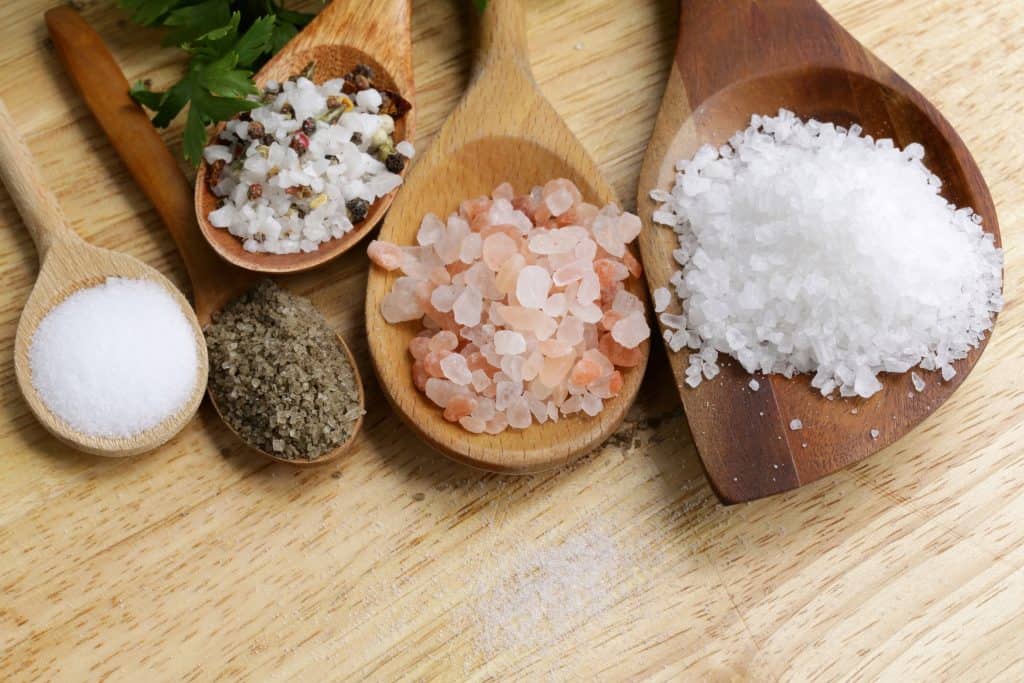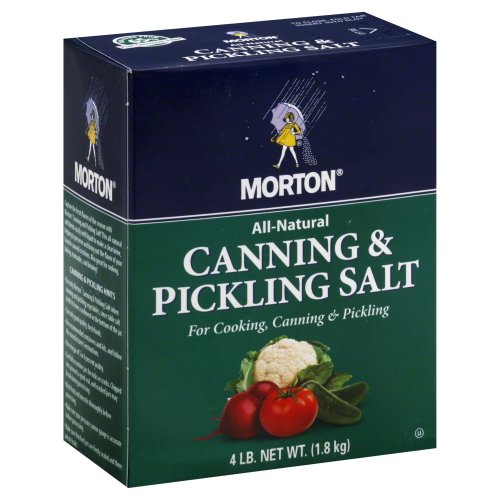
Pickling salt is also referred to as canning salt. It is the best salt to use for all your pickling projects. Pickling slat is fine, granulated, pure sodium chloride. Some people also call ‘sea salt’ as pickling salt, but the term sea salt is unregulated. As a result, you might see many brands of common table salt use the words ‘sea salt’ on their packaging.
Table salt contains potassium iodide, which is a nutrient. It also contains dextrose, a stabilizer. And almost all brands of table salts contain a host of chemicals such as calcium silicate, sodium silico-aluminate, and silicon dioxide. Some even contain chemicals like tri-calcium phosphate and magnesium carbonate. These chemicals prevent caking of the salt.
You can recognize common table salt by dissolving a little bit in a glass of water. It won’t dissolve completely, but it will leave a whitish haze in the water. This is not harmful to health but it muddies up the pickling liquid. Potassium iodide found in table salt tends to darken pickled vegetables.
That is why it is important to only use pickling salt for your fermentation recipes.
In this guide, we will discuss the best salt to use for fermentation as well as the differences between different varieties of salts that are suitable for pickling recipes.
Table of Contents
Salt to use for fermentation
Salt is an essential ingredient in fermentation. It is necessary for flavor and for balancing the pH of the brine. Good pickling salt prevents spoilage of the ferment. When you use the right salt, you can retain the beautiful colors of your vegetables.
Much like dried spices and herbs, minimizing the amount of salt will prevent the jarred foods from intensifying in flavor as they sit in your pantry. Pickling salt, canning salt, kosher salt, Himalayan Pink salt, and sea salt are varieties of salts that are not packed with chemicals. Most of these salts dissolve nicely and give you clear brine.
You can always use table salt or iodized salt for fermentation but, since they contain anti-caking chemicals, they usually result in cloudy-looking brine and also produce sediment at the bottom of the jar. Unless you are worried about the presentation, it is absolutely fine to use table salt for fermentation projects.
Pickling salt vs. Kosher salt
Kosher salt is a great salt for pickling. Both, pickling salt and kosher salt, do not contain iodine. Kosher salt is a pure salt. It is devoid of chemicals and anti-caking ingredients.
Kosher salt has larger crystals that are less densely packed than the crystals of pickling salt and table salt. That is why, when you use kosher salt in a recipe to replace pickling salt, you may need more (nearly one and a half times) than the pickling salt.
A disadvantage of kosher salt is that it is slow to dissolve. You may have seen many pickling recipes which call for the heating of the brine. This is usually required when the recipe uses kosher salt.
If your water is clean and fresh, and your salt is fine enough, you do not have to heat the brine before pouring over the vegetables. Always read the ingredient list on your kosher salt packaging to ensure that it is indeed free from anti-caking chemicals and iodine.
Pickling salt vs. Himalayan salt
Himalayan pink salt is naturally pinkish in color. It contains nearly 84 minerals and trace minerals and is mined in Pakistan.
Himalayan pink salt is believed to have come from ancient dried-up oceans. It is usually mined by hand and washed after being collected from unspoiled underground sources. Therefore, it is less likely to be contaminated by heavy toxic metals. However, you might still find small non-harmful amounts of radioactive elements in it. Himalayan salt is the most expensive of all popular salt varieties.
Pickling salt is different from Himalayan salt in that it is usually sea salt and it comes in different textures like coarse, powdered, or granular. Also, it is filled with 60 trace minerals.
Like Himalayan salt, pickling salt is devoid of anti-caking chemicals. Unlike Himalayan salt, pickling salt usually does not contain radioactive elements.
Best salt for sauerkraut
Salt is an important ingredient while making sauerkraut and pickled vegetables. I like to use unrefined sea salt or anything labelled as pickling or canning salt, but you can use any sea salt, Himalayan salt, or kosher salt.
Seasoned fermenters avoid using ordinary table salt which is packed with iodine. Iodine, like chlorine in the tap water, is antimicrobial. Thus, it tends to inhibit fermentation. I have tried iodized table salt to make my kraut and it has worked fine except for the cloudy brine.
If you plan to use coarse salts, then the same volume of salt will weigh a bit more, so you’d need a little less volume of it than fine ground salts. Note that most pickling recipes assume that you will use fine salts only.
Best pickling salt
Celtic Sea Salt, Fine Ground
If you are looking for the best pickling salt that is authentic and unprocessed, then you will love this fine ground Celtic sea salt. This salt comes in a variety of sizes ranging from half a pound to about 22 lbs.
This is a must-have salt for pickling, canning, baking, and everyday cooking. Celtic sea salt has been made by a family-owned company since 1976. It has an alkaline pH, is kosher, and is ideal for finishing, pickling, and canning.
Celtic Sea salt is very healthy and suitable for people with high blood pressure. It is mined using sustainable methods and is perfect for paleo and gluten free diets.
Pros
- Thousands of happy customers who have used it for pickling and canning.
- Celtic sea salt contains high mineral and trace mineral content.
- It has an awesome taste and texture that is suitable for baking, finishing, gourmet dishes, and even in your herbal teas.
- Celtic sea salt will give your fermented dishes a great flavour, lovely presentation, and is value for money.
- Celtic sea salt is recommended for people with high blood pressure.
- People who even get swollen feet due to Himalayan sea salt usually tolerate Celtic sea salt very well.
Cons
- Coarse, gritty, and clumped texture of which some people disapprove.
- Tends to leave dark sediments and does not dissolve completely in water.
- Does not contain iodine; which, for people with iodine deficiency, may be a bad thing.
Morton Canning and Pickling Salt
Morton canning and pickling salt is non-iodized and free from anti-caking chemicals. It is made in the United States and is completely free from toxins.
Pros
- Wonderful flavor
- Value for money
- Ideal for pickling and canning recipes. You can also use it for your everyday cooking.
- A little bit goes a long way; so you need to use less, especially in daily cooking.
Cons
- Poor packaging; box tends to rip and open during shipping.
- Tendency to cake and clump but that is expected since it does not have anti-caking chemicals.
Himalayan Salt by Pink Sherpa
Himalayan salt has become well known for its health benefits. Himalayan pink salt is rich in trace minerals including calcium, magnesium, potassium, copper and iron.
It’s packaged in the US and it’s kosher certified, non-GMO, and doesn’t contain any anti-caking agents.This salt is one of the best selling extra-grain fine salts on the market.
Pros
- Packed with minerals.
- Delicate flavor, sweeter, and more subtle.
- Saltier (need to use less salt per serving or in fermentation compared to other salts).
- Himalayan salt is less artificial than other salts and does not usually contain additives.
Cons
- Coarse – slower to dissolve.
Ball Pickling Salt
Ball pickling salt is available in a convenient zippered pouch to prevent clumping and moisture. This pure canning and pickling salt is devoid of iodine and anticaking chemicals which render your pickles dark in color.
Pros
- All your pickling recipes will be ideal each time you use Bell pickling salt. Thanks to no additives and iodine, the brine won’t turn black.
- Bell makes consistently great products at affordable prices.
- The zippered bag ensures keeping your salt free from moisture.
- Great for pickling eggs and cucumbers; also ideal for all your canning recipes.
Cons
- Packaging is not the best and may leak salt during transport.
Pickling salt substitute
Any low-quality, chemical-rich salt is going to negatively impact your pickles. Poor salt substitute can leave your pickles bitter.
Cloudy pickles also indicate that you may have used ordinary table salt that impacted the fermentation. In case you do not have pickling salt, use canning salt or pure, granulated, pure salt with no additives. Here are the best pickling salt substitutes:
Sea salt
Sea salt is rich in minerals and only contains traces of iodine or none at all. Avoid using sea salt flakes; they are delicious as finishing salt but they measure differently and your recipes can get thrown off if you use them.
Kosher salt
Kosher salt is excellent for pickling and does not contain anti-caking materials, is non-iodized, and also inexpensive.
Worst salts for pickling
Low-sodium or ‘lite’-salts
For fermented foods like sauerkraut and kimchi, sodium is an essential ingredient. It is needed for the fermentation process and helps with the preservation of vegetables.
Low-sodium salts do not create the right environment for fermentation and can also render your ferment susceptible to mould and other harmful microbes.
Iodized salts
There is actually no harm in using iodized salts other than for aesthetic reasons. They darken the brine and pickled vegetables lose their original colours.
Sea salt flakes
Sea salt flakes measure differently in weight and volume compared to what most pickling recipes call for. They are also more expensive than regular sea salt.
Conclusion
Pickling salt is the best option when it comes to your pickling or fermentation recipes. It contains neither iodine nor any anti-caking chemicals which ordinary table salt contains.
Pickling salt is finely ground so it dissolves easily. The downside to pickling salt is that it is expensive compared to regular table salt. If budget is a concern, you can go in for kosher salt which is inexpensive and also free from iodine and anti-caking materials.
Always read the label of your salt to ensure there are no additives before buying. Happy pickling!





You stated Kosher salt doesn’t have an anti-caking agent. If it is just the plain Kosher Salt from Morton’s it does. Maybe the canning and pickling salt doesn’t but the regular Kosher Salt does in fact have an anti-caking agent.
I know because I’ve been scrounging all over my house for the “right salt”.